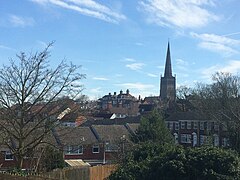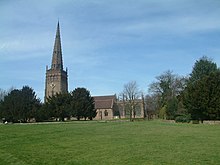This is the current revision of this page, as edited by Gksgnk7 (talk | contribs) at 17:46, 2 December 2024 (reflects local pronunciation). The present address (URL) is a permanent link to this version.
Revision as of 17:46, 2 December 2024 by Gksgnk7 (talk | contribs) (reflects local pronunciation)(diff) ← Previous revision | Latest revision (diff) | Newer revision → (diff) Market town in Warwickshire, England| This article needs additional citations for verification. Please help improve this article by adding citations to reliable sources. Unsourced material may be challenged and removed. Find sources: "Coleshill, Warwickshire" – news · newspapers · books · scholar · JSTOR (February 2023) (Learn how and when to remove this message) |
Human settlement in England
| Coleshill | |
|---|---|
 Seen from the northwest with the Church of St. Peter and St. Paul in view Seen from the northwest with the Church of St. Peter and St. Paul in view | |
 High Street High Street | |
 | |
| Population | 6,900 (2021 Census) |
| OS grid reference | SP2089 |
| Civil parish |
|
| District | |
| Shire county | |
| Region | |
| Country | England |
| Sovereign state | United Kingdom |
| Post town | BIRMINGHAM |
| Postcode district | B46 |
| Dialling code | 01675 |
| Police | Warwickshire |
| Fire | Warwickshire |
| Ambulance | West Midlands |
| UK Parliament | |
| |
Coleshill (/ˈkoʊzɪl/ KOH-zil) is a market town and civil parish in the North Warwickshire district of Warwickshire, England, taking its name from the River Cole, on which it stands. It had a population of 6,900 in the 2021 Census, and is situated 11 miles (18 km) east of Birmingham, 8.5 miles (13.7 km) southeast of Sutton Coldfield, 11 miles (18 km) south of Tamworth, 13 miles (21 km) northwest of Coventry by road and 13 miles (21km) west of Nuneaton. It borders the parish village of Kingshurst in the Metropolitan Borough of Solihull to the west. It is also home to the 502 year The Coleshill School seated next to the dual carriageway.
Geography
Coleshill is located on a ridge between the rivers Cole and Blythe which converge to the north with the River Tame. It is adjacent to the border with West Midlands county, and is just outside Birmingham.
Climate
| Climate data for Coleshill (1991–2020) | |||||||||||||
|---|---|---|---|---|---|---|---|---|---|---|---|---|---|
| Month | Jan | Feb | Mar | Apr | May | Jun | Jul | Aug | Sep | Oct | Nov | Dec | Year |
| Mean daily maximum °C (°F) | 7.3 (45.1) |
8.0 (46.4) |
10.5 (50.9) |
13.5 (56.3) |
16.6 (61.9) |
19.6 (67.3) |
22.0 (71.6) |
21.5 (70.7) |
18.6 (65.5) |
14.2 (57.6) |
10.2 (50.4) |
7.6 (45.7) |
14.2 (57.6) |
| Mean daily minimum °C (°F) | 1.7 (35.1) |
1.7 (35.1) |
2.9 (37.2) |
4.4 (39.9) |
7.1 (44.8) |
10.0 (50.0) |
12.0 (53.6) |
12.0 (53.6) |
10.0 (50.0) |
7.3 (45.1) |
4.2 (39.6) |
2.0 (35.6) |
6.3 (43.3) |
| Average rainfall mm (inches) | 63.6 (2.50) |
47.0 (1.85) |
46.6 (1.83) |
48.1 (1.89) |
53.8 (2.12) |
64.9 (2.56) |
52.9 (2.08) |
66.2 (2.61) |
58.1 (2.29) |
72.8 (2.87) |
69.6 (2.74) |
64.7 (2.55) |
708.2 (27.88) |
| Average rainy days (≥ 1 mm) | 12.4 | 9.8 | 9.9 | 10.1 | 9.8 | 9.6 | 8.9 | 10.5 | 9.6 | 11.6 | 13.0 | 11.7 | 127.1 |
| Mean monthly sunshine hours | 55.1 | 72.0 | 116.7 | 147.1 | 193.3 | 192.6 | 194.0 | 170.7 | 130.7 | 100.2 | 66.2 | 62.6 | 1,501.2 |
| Source: Met Office | |||||||||||||
History
Coleshill began life in the Iron Age, before the Roman conquest of 43 AD at the Grimstock Hill Romano-British settlement, north of the River Cole. Evidence of hut circles were found by archaeologists at the end of the 1970s. These excavations showed that throughout the Roman period there was a Romano-Celtic temple on Grimstock Hill. It had developed over the earlier Iron Age huts and had gone through at least three phases of development. The area was at the junction of two powerful Celtic Tribes – the Coritanii to the east from Leicester, and to the west the Cornovii from Viroconium Cornoviorum. In the post Roman or Arthurian period (The Dark Ages), the nucleus of Coleshill moved about a kilometre to the south, to the top of the hill. Here the present church is set and the medieval town developed around it.
By 1066 the town was a Royal Manor held by King Edward the Confessor and is recorded in the Domesday Book of 1086 as land held by William the Conqueror and the site of the court for the ancient hundred of Coleshill. In 1284/5 John de Clinton, elder, was granted Coleshill Manor by King Henry II, and claimed by prescription within the lordship of Coleshill, Assize of bread and ale, gallows, pillory, tumbrell and court leet, infangthef and utfangthef, a market, fair, and free warren. He died in 1316. His heir was his 12-year-old grandson, John, who subsequently married a daughter of Sir Roger Hilary, and died in 1353 or 1354 leaving one daughter Joan. She had as her first husband Sir John of Montfort, illegitimate son of Sir Peter de Montfort of Beaudesert.
Coleshill Manor then passed to this branch of Sir Simon de Montford who moated the manor houses at Coleshill and Kingshurst. King Henry VII granted Coleshill Manor and its lands to Simon Digby in 1496 following the execution and forfeiture of Sir Simon de Montford for supporting the rebellion of Perkin Warbeck. The (Wingfield-Digby) family descendants still hold the titles. Coleshill village was granted a market charter by King John in 1207, alongside Liverpool, Leek and Great Yarmouth. During the era of stagecoach and the turnpike trusts, Coleshill became important as a major staging post on the coaching roads from London to Chester, Liverpool and Holyhead. At one point there were over twenty inns in the town. The Coleshill to Lichfield Turnpike dates from 1743.
Notable buildings

Many former coaching inns remain in Coleshill, mostly along the High Street and Coventry Road. One of the most notable buildings in the town is the parish's Church of St Peter and St Paul at the top of the Market Square. It has a 52-metre (170 ft) high steeple, one of the finest in Warwickshire, dating from the 13th century. Inside there is a 12th-century font of Norman origin, which is one of the finest examples in the country. There are also medieval table tombs with effigies of knights, including John de Clinton. Just outside the south door are the preserved remains of a medieval cross.
Church Street is the location of the town's pillory and whipping post, which were last used in 1863. A bronze sculpture by Peter Walker in the High Street shows three themes of the town's origins: a stagecoach wheel, a visiting circus elephant and the creation of the Typhoo Tea brand by John Sumner.
Transport

The town is close to the M6, M6 Toll and M42 motorways. It is on Junction 4 of the M6, with Birmingham City Centre at Junction 6, Sutton Coldfield J5, Nuneaton, Bedworth and Coventry North at J3 and Coventry East at Junction 2. The town is connected to East Birmingham by the B4114 Road which subsequently creates a road connection into Birmingham City Centre. There is also a route to Coventry via the A446, which becomes the A452 just before the A45 road junction at Stonebridge. Upon reaching the Western edge of Coventry, it is necessary to follow the A4114 road which now takes you to the city centre ring road A4053 after the A45 was diverted to run south of Coventry acting as a bypass.
Two regular bus routes serve the town. The X13 (previously called X70) passes through Coleshill between Birmingham and Chelmsley Wood operated by National Express West Midlands. The 76 passes through between Tamworth and Sutton Coldfield operated by Diamond Bus.
The town is served by Coleshill Parkway railway station, which reopened in 2007, on the site of the previous Coleshill station, which had closed in 1968. It is on the Birmingham to Peterborough Line and is served half hourly by CrossCountry as part of their service between Birmingham, Nuneaton, Leicester, Peterborough, Cambridge and Stansted Airport. Historically the town was also served by Maxstoke on the Stonebridge Railway which closed in 1917 and Coleshill railway station, originally named Forge Mills, which closed in 1968. As a result until 2007, the town's nearest railway station was at Water Orton, some 2.5 miles (4 km) to the north-west.
Media
Local news and television programmes are provided by BBC West Midlands and ITV Central. Television signals are received from the Sutton Coldfield TV transmitter. The town is served by both BBC WM on 95.6 FM and BBC CWR on 94.8 FM. Other radio stations received in the town are Heart West Midlands on 100.7 FM, Smooth West Midlands on 105.7 FM, Capital Mid-Counties on 96.2 FM, Greatest Hits Radio Birmingham & The West Midlands on 105.2 FM, and Hits Radio Coventry & Warwickshire on 97.0 FM. The town is served by local newspapers, Leamington Courier and Warwick Courier.
Twin Town
Coleshill has been twinned with Chassieu near Lyons in France since 1983.
Education
- The Coleshill School
- Coleshill Church of England Primary School
- St Edwards Roman Catholic Primary School
- High Meadow Community School Primary School
- Woodland Special School
Notable people from Coleshill
- Reverend George Lloyd (1820–1885), a curate and archaeologist
- Baron Plumb, farmer and politician (passed in 2023)
- John Wynne (1819–1893), cricketer
References
- "COLESHILL Parish in West Midlands". City Population. Retrieved 12 February 2023.
- Geoff, Allen (2000). Warwickshire Towns & Villages. Sigma Press. pp. 42–43. ISBN 1-85058-642-X.
- "Coleshill (Warwickshire) UK climate averages - Met Office". Met Office. Retrieved 21 July 2024.
- Open Domesday Online: Coleshill, Warwickshire
- "COLESHILL PILLORY". Our Warwickshire. Retrieved 12 February 2023.
- "Sutton Coldfield (Birmingham, England) Full Freeview transmitter". UK Free TV. 1 May 2004. Retrieved 26 December 2023.
- "Leamington Courier". British Papers. 14 January 2014. Retrieved 28 December 2023.
- "Warwick Courier". British Papers. 4 June 2014. Retrieved 28 December 2023.
External links
- Coleshill Town Council
- Coleshill Community
- Coleshill at British History Online
- Coleshill archives at Our Warwickshire
| Ceremonial county of Warwickshire | |
|---|---|
| Boroughs or districts | |
| Major settlements (cities in italics) | |
| Rivers | |
| Canals | |
| Topics | |